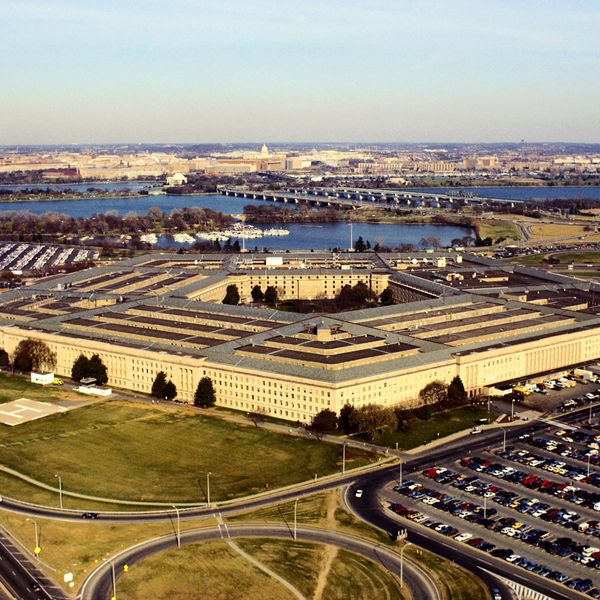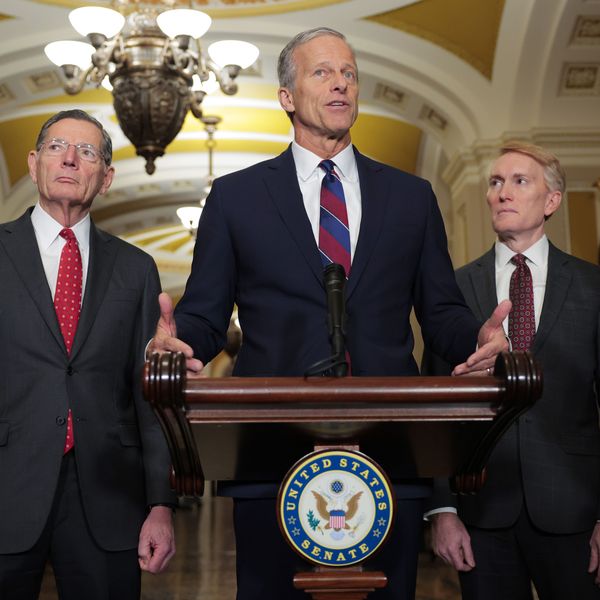
Sen. Joe Manchin (D-W.Va.) speaks to reporters before a caucus meeting with fellow Senate Democrats on Capitol Hill on January 18, 2022 in Washington, D.C. (Photo: Drew Angerer/Getty Images)
12 Senate Dems Join GOP in Voting to End Covid National Emergency Declaration
The Biden administration warned final passage of the resolution would compromise its ability to fight the ongoing pandemic.
Twelve members of the Senate Democratic caucus joined Republicans on Tuesday in approving a resolution aimed at terminating the national emergency declaration for Covid-19, even as the Biden administration warned the measure would undercut its efforts to fight the ongoing pandemic.
While the White House said Tuesday that President Joe Biden will veto the resolution if it passes the House and reaches his desk, the Senate vote sparked outrage among public health experts and others who stressed the potentially major implications of the resolution. The national emergency status has given the federal government the flexibility to suspend student loan repayment deadlines, among other steps.
Dr. Lucky Tran, a scientist and public health advocate, noted that the end of the national emergency declaration would also impact "med[ical] supply tools" and "some healthcare access policies."
" Medicaid, telehealth, vaccines etc. [are] unchanged for now, but this is a political step to dismantling all Covid policies," Tran argued.
Sens. Joe Manchin (D-W.Va.), Kyrsten Sinema (D-Ariz.), Mark Warner (D-Va.), John Hickenlooper (D-Colo.), Jon Tester (D-Mont.), Angus King (I-Maine), Chris Murphy (D-Conn.), Tim Kaine (D-Va.), Jeanne Shaheen (D-N.H.), Jacky Rosen (D-Nev.), Amy Klobuchar (D-Minn.), and Catherine Marie Cortez Masto (D-Nev.) voted for the resolution.
Every Senate Republican with the exception of Sen. Ben Sasse (R-Neb.)--who did not vote--also backed the resolution, which was put forth by Sen. Roger Marshall (R-Kan.).
Senate Majority Leader Chuck Schumer (D-N.Y.) was originally listed as a "yes" vote on the resolution, but his office later said that was a mistake and the roll call was corrected.
In a statement on Tuesday, the White House Office of Management and Budget (OMB) warned that enactment of the resolution would "unnecessarily and abruptly curtail the ability of the administration to respond to Covid-19."
"Preserving our ability to respond is more important than ever as we head into the winter, when respiratory illnesses such as Covid-19 typically spread more easily," the OMB said. "Strengthened by the ongoing declaration of national emergency, the federal response to Covid-19 continues to save lives, improve health outcomes, and support the American economy. Action by Congress to end these authorities abruptly and prematurely would be a reckless and costly mistake."
"If Congress passes this resolution," the agency added, "the president will veto it."
Advocates have voiced alarm over recent Republican-backed efforts to roll back coronavirus-related emergency measures as public health experts warn of another wave of infections and hospitalizations. In addition to targeting the national emergency declaration with the newly passed resolution, Republicans have taken aim at the Health and Human Services Department's separate Public Health Emergency (PHE), which is set to lapse in January.
The Families First Coronavirus Response Act, a measure that Congress approved in 2020, loosened Medicaid eligibility requirements and restricted states from removing people from the program for the duration of the PHE.
The legislation's continuous coverage mandate allowed millions of people to obtain and keep health insurance as the pandemic wreaked havoc on the economy, throwing people out of work and off their employer-sponsored plans.
In a report released in August, the Biden Health and Human Services Department estimated that around 15 million people--including millions of kids--could lose Medicaid and Children's Health Insurance Program (CHIP) coverage once the public health emergency declaration ends.
Advocates have also warned that millions of people across the U.S. could see their food benefits cut substantially once the HHS public health emergency declaration expires.
"The U.S. must be ready to ensure that it does not jeopardize the health and food needs of households across the country," a trio of experts wrote in a STAT op-ed last month. "Urgent action by healthcare systems, community organizations, and all levels of government will be necessary to stabilize health and food security among those at greatest risk."
"While vaccines and treatments lessen the life-altering threat of Covid-19," they added, "it is important not to lose sight of the imminent danger to health posed by the expiration of effective expansions of Medicaid and SNAP."
An earlier version of this story was unclear about the distinction between the Covid-19 national emergency declaration and the Health and Human Services Department's Public Health Emergency and misstated the impacts of the newly passed resolution.
An Urgent Message From Our Co-Founder
Dear Common Dreams reader, The U.S. is on a fast track to authoritarianism like nothing I've ever seen. Meanwhile, corporate news outlets are utterly capitulating to Trump, twisting their coverage to avoid drawing his ire while lining up to stuff cash in his pockets. That's why I believe that Common Dreams is doing the best and most consequential reporting that we've ever done. Our small but mighty team is a progressive reporting powerhouse, covering the news every day that the corporate media never will. Our mission has always been simple: To inform. To inspire. And to ignite change for the common good. Now here's the key piece that I want all our readers to understand: None of this would be possible without your financial support. That's not just some fundraising cliche. It's the absolute and literal truth. We don't accept corporate advertising and never will. We don't have a paywall because we don't think people should be blocked from critical news based on their ability to pay. Everything we do is funded by the donations of readers like you. Will you donate now to help power the nonprofit, independent reporting of Common Dreams? Thank you for being a vital member of our community. Together, we can keep independent journalism alive when it’s needed most. - Craig Brown, Co-founder |
Twelve members of the Senate Democratic caucus joined Republicans on Tuesday in approving a resolution aimed at terminating the national emergency declaration for Covid-19, even as the Biden administration warned the measure would undercut its efforts to fight the ongoing pandemic.
While the White House said Tuesday that President Joe Biden will veto the resolution if it passes the House and reaches his desk, the Senate vote sparked outrage among public health experts and others who stressed the potentially major implications of the resolution. The national emergency status has given the federal government the flexibility to suspend student loan repayment deadlines, among other steps.
Dr. Lucky Tran, a scientist and public health advocate, noted that the end of the national emergency declaration would also impact "med[ical] supply tools" and "some healthcare access policies."
" Medicaid, telehealth, vaccines etc. [are] unchanged for now, but this is a political step to dismantling all Covid policies," Tran argued.
Sens. Joe Manchin (D-W.Va.), Kyrsten Sinema (D-Ariz.), Mark Warner (D-Va.), John Hickenlooper (D-Colo.), Jon Tester (D-Mont.), Angus King (I-Maine), Chris Murphy (D-Conn.), Tim Kaine (D-Va.), Jeanne Shaheen (D-N.H.), Jacky Rosen (D-Nev.), Amy Klobuchar (D-Minn.), and Catherine Marie Cortez Masto (D-Nev.) voted for the resolution.
Every Senate Republican with the exception of Sen. Ben Sasse (R-Neb.)--who did not vote--also backed the resolution, which was put forth by Sen. Roger Marshall (R-Kan.).
Senate Majority Leader Chuck Schumer (D-N.Y.) was originally listed as a "yes" vote on the resolution, but his office later said that was a mistake and the roll call was corrected.
In a statement on Tuesday, the White House Office of Management and Budget (OMB) warned that enactment of the resolution would "unnecessarily and abruptly curtail the ability of the administration to respond to Covid-19."
"Preserving our ability to respond is more important than ever as we head into the winter, when respiratory illnesses such as Covid-19 typically spread more easily," the OMB said. "Strengthened by the ongoing declaration of national emergency, the federal response to Covid-19 continues to save lives, improve health outcomes, and support the American economy. Action by Congress to end these authorities abruptly and prematurely would be a reckless and costly mistake."
"If Congress passes this resolution," the agency added, "the president will veto it."
Advocates have voiced alarm over recent Republican-backed efforts to roll back coronavirus-related emergency measures as public health experts warn of another wave of infections and hospitalizations. In addition to targeting the national emergency declaration with the newly passed resolution, Republicans have taken aim at the Health and Human Services Department's separate Public Health Emergency (PHE), which is set to lapse in January.
The Families First Coronavirus Response Act, a measure that Congress approved in 2020, loosened Medicaid eligibility requirements and restricted states from removing people from the program for the duration of the PHE.
The legislation's continuous coverage mandate allowed millions of people to obtain and keep health insurance as the pandemic wreaked havoc on the economy, throwing people out of work and off their employer-sponsored plans.
In a report released in August, the Biden Health and Human Services Department estimated that around 15 million people--including millions of kids--could lose Medicaid and Children's Health Insurance Program (CHIP) coverage once the public health emergency declaration ends.
Advocates have also warned that millions of people across the U.S. could see their food benefits cut substantially once the HHS public health emergency declaration expires.
"The U.S. must be ready to ensure that it does not jeopardize the health and food needs of households across the country," a trio of experts wrote in a STAT op-ed last month. "Urgent action by healthcare systems, community organizations, and all levels of government will be necessary to stabilize health and food security among those at greatest risk."
"While vaccines and treatments lessen the life-altering threat of Covid-19," they added, "it is important not to lose sight of the imminent danger to health posed by the expiration of effective expansions of Medicaid and SNAP."
An earlier version of this story was unclear about the distinction between the Covid-19 national emergency declaration and the Health and Human Services Department's Public Health Emergency and misstated the impacts of the newly passed resolution.
Twelve members of the Senate Democratic caucus joined Republicans on Tuesday in approving a resolution aimed at terminating the national emergency declaration for Covid-19, even as the Biden administration warned the measure would undercut its efforts to fight the ongoing pandemic.
While the White House said Tuesday that President Joe Biden will veto the resolution if it passes the House and reaches his desk, the Senate vote sparked outrage among public health experts and others who stressed the potentially major implications of the resolution. The national emergency status has given the federal government the flexibility to suspend student loan repayment deadlines, among other steps.
Dr. Lucky Tran, a scientist and public health advocate, noted that the end of the national emergency declaration would also impact "med[ical] supply tools" and "some healthcare access policies."
" Medicaid, telehealth, vaccines etc. [are] unchanged for now, but this is a political step to dismantling all Covid policies," Tran argued.
Sens. Joe Manchin (D-W.Va.), Kyrsten Sinema (D-Ariz.), Mark Warner (D-Va.), John Hickenlooper (D-Colo.), Jon Tester (D-Mont.), Angus King (I-Maine), Chris Murphy (D-Conn.), Tim Kaine (D-Va.), Jeanne Shaheen (D-N.H.), Jacky Rosen (D-Nev.), Amy Klobuchar (D-Minn.), and Catherine Marie Cortez Masto (D-Nev.) voted for the resolution.
Every Senate Republican with the exception of Sen. Ben Sasse (R-Neb.)--who did not vote--also backed the resolution, which was put forth by Sen. Roger Marshall (R-Kan.).
Senate Majority Leader Chuck Schumer (D-N.Y.) was originally listed as a "yes" vote on the resolution, but his office later said that was a mistake and the roll call was corrected.
In a statement on Tuesday, the White House Office of Management and Budget (OMB) warned that enactment of the resolution would "unnecessarily and abruptly curtail the ability of the administration to respond to Covid-19."
"Preserving our ability to respond is more important than ever as we head into the winter, when respiratory illnesses such as Covid-19 typically spread more easily," the OMB said. "Strengthened by the ongoing declaration of national emergency, the federal response to Covid-19 continues to save lives, improve health outcomes, and support the American economy. Action by Congress to end these authorities abruptly and prematurely would be a reckless and costly mistake."
"If Congress passes this resolution," the agency added, "the president will veto it."
Advocates have voiced alarm over recent Republican-backed efforts to roll back coronavirus-related emergency measures as public health experts warn of another wave of infections and hospitalizations. In addition to targeting the national emergency declaration with the newly passed resolution, Republicans have taken aim at the Health and Human Services Department's separate Public Health Emergency (PHE), which is set to lapse in January.
The Families First Coronavirus Response Act, a measure that Congress approved in 2020, loosened Medicaid eligibility requirements and restricted states from removing people from the program for the duration of the PHE.
The legislation's continuous coverage mandate allowed millions of people to obtain and keep health insurance as the pandemic wreaked havoc on the economy, throwing people out of work and off their employer-sponsored plans.
In a report released in August, the Biden Health and Human Services Department estimated that around 15 million people--including millions of kids--could lose Medicaid and Children's Health Insurance Program (CHIP) coverage once the public health emergency declaration ends.
Advocates have also warned that millions of people across the U.S. could see their food benefits cut substantially once the HHS public health emergency declaration expires.
"The U.S. must be ready to ensure that it does not jeopardize the health and food needs of households across the country," a trio of experts wrote in a STAT op-ed last month. "Urgent action by healthcare systems, community organizations, and all levels of government will be necessary to stabilize health and food security among those at greatest risk."
"While vaccines and treatments lessen the life-altering threat of Covid-19," they added, "it is important not to lose sight of the imminent danger to health posed by the expiration of effective expansions of Medicaid and SNAP."
An earlier version of this story was unclear about the distinction between the Covid-19 national emergency declaration and the Health and Human Services Department's Public Health Emergency and misstated the impacts of the newly passed resolution.

